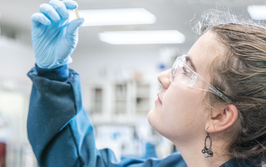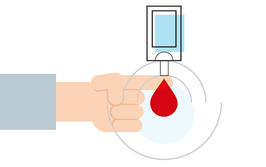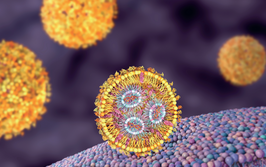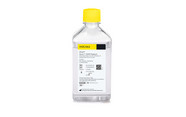
Moving Away From “Quality by Fear”: Part I
Fear of the unknown has made pharma companies reluctant to use novel excipients. And excipient manufacturers – due to uncertainty in realizing business benefits in developing new excipients for pharma are reluctant to make significant investments The result? Limited innovation in novel excipients to support the new drug modalities coming through industry pipelines – and less than optimized drug formulations reaching patients..
In September 2021, the CDER launched a Novel Excipient Review Pilot Program to allow excipient manufacturers to obtain FDA review of certain novel excipients prior to their use in drug formulations. I had the privilege of speaking with five gurus from IPEC-Americas about the pilot, who explained why this is so important for formulators. IPEC has spent years advocating for ways to break down the hurdles associated with novel excipients – including fear of the unknown.
You can watch the full panel discussion here.
But here is an abridged version to whet your appetite, focusing on the importance of novel excipients and the challenges hindering development and uptake.
Five Excipient Experts

Kathy Ulman
“I’m the President and owner of KLU Consulting. I retired from the role of Global Regulatory Manager for Dow Corning’s healthcare business in 2016 after 40 years in their silicones business. I am a consultant with IPEC-Americas. I’m also the Vice Chair of the Regulatory Affairs Committee.”

Dave Schoneker
“I’m the President and owner of Black Diamond Regulatory Consulting. I’ve been involved in the excipient industry for over 43 years. I am the former Director of Global Regulatory Affairs at Colorcon and I am one of the original founders of IPEC-Americas.”

Priscilla Zawislak
“I’m the Global Regulatory Affairs Advocacy Manager at International Flavours and Fragrances (IFF). I have over 40 years’ experience in the industry with food additives, excipients, and APIs. I’m the Immediate Past Chair of IPEC-Americas.”

Nigel Langley
“I’m the Global Technology Director for BASF for our pharma solutions business. Since January 2022, I have been the Chair of IPEC-Americas and will hold the position for two years.”

Meera Raghuram
“I’m the Director for Regulatory and Sustainability at Lubrizol, where I manage the regulatory strategy and policy for our health, home, and beauty business. I lead IPEC-America’s Regulatory Affairs Committee and I’m also on the IPEC-Americas board.”
Why does the pharma industry need novel excipients? Or why don't existing excipients meet current needs?
NL: There are currently many unmet needs and challenges with formulating drugs. For example, many small molecule drugs are poorly soluble, poorly bioavailable and, in some cases, poorly permeable. In addition, to improve the stability of biologic drugs, excipients are used to stop proteins and peptides from agglomerating – and there’s still a great deal of room for improvement. There are also other applications that could benefit from novel excipients, such as taste masking very bitter drug actives for pediatric and geriatric medicines. These patient groups often find it difficult to swallow conventional tablets, but if you’re going to make an alternative form then masking the bitter taste with the appropriate excipient is very important.
Novel excipients could also help improve manufacturing processes; consider continuous manufacturing, which is an important development occurring in the industry. New materials can help make continuous processing more efficient. And then there is 3D printing, which could potentially be used to make tablets and different dosage forms for personalized medicine; again, we need the right excipients to make the optimum printed drug.
In addition, it’s important to consider that many of the excipients that formulators currently use were developed more than 50 years ago – and often weren’t developed specifically for the pharmaceutical industry, so formulators don’t necessarily have excipients designed specifically for the challenges they face. At the same time, drug modalities have been accelerating, with advances in different therapies. At IPEC-Americas, we feel that excipient use lags behind need.
DS: It has also been extremely difficult to bring forward a novel excipient with any degree of certainty – and that has resulted in many companies no longer developing novel excipients. Ironically, there has never been a greater need for truly novel excipients. It’s a real problem.
KU: Nigel summed up the importance of novel excipients well. Novel excipients could bring so many benefits to formulators – and to patients. They don’t just influence drug delivery, but can also improve stability and manufacturability.
MR: When you look at therapies today, there are new dosage forms and breakthrough therapies that simply didn’t exist 20 years ago, such as targeted immunotherapy agents and certain combination products. They require unique formulation solutions – and that means more novel excipients.
PZ: Meera is right. The traditional formulations and solutions we have do not always work for the types of drugs that need to be developed today.
DS: A good example is the mRNA COVID-19 vaccines. It was a novel, lipid nanoparticle type of excipient that had not been previously used that really facilitated some of the development work on the vaccines. It is a clear example of where a novel excipient helped the industry meet an unmet patient need in a critical situation.

IPEC-Americas has been advocating for a review program for novel excipients for years
Why has the development of novel excipients not been a priority?
MR: I wouldn’t say that it hasn’t been a priority; the perceived hurdles and unknowns about what is needed to achieve success are really to blame. We have to recognize that excipients are generally a small part of a chemical industry manufacturer’s portfolio and significant investments just for pharma are often limited due to a lack of clear pathway on how they could achieve market success. There is no clear answer on what it takes to market a novel excipient because historically there hasn’t been an independent review pathway – the approval of novel excipients has always been dependent on the drug approval process. In other words, even if you have a very promising excipient candidate that provides unique performance, you may not be able to bring it to market.
Additionally, one major aspect of novel excipient development relates to toxicity and safety studies. Although there is pharmaceutical safety evaluation guidance from FDA, which was issued in May 2005, it doesn’t provide a clear pathway for an excipient and there are many factors that are ambiguous. The guidance alludes to exceptions to testing, so there are exceptions where you can use various scientific reasoning to evaluate what safety testing is needed. But an excipient manufacturer will only get clarity and definite input if the excipient is picked up by a drug applicant and goes through the drug approval process.
DS: It comes down to risk and uncertainty. There is often a misunderstanding where people claim that regulators are making it difficult and preventing innovation, but it’s not really an issue with the regulators. Regulators are perfectly willing to look at any safety data submitted as part of a drug application. If you have the appropriate information, there shouldn’t be a problem. But pharmaceutical companies are risk averse and concerned about uncertainty the first time a novel excipient is used. Is there enough information to support the safety? What will FDA or other regulatory agencies say about that data? Will it create a potential delay in getting my drug approved?
Something we have been talking about within IPEC-Americas for many years is how to lower the risk level so that pharmaceutical companies no longer have the fear of the unknown. We want to give them more confidence to use novel excipients.
I know of circumstances where pharma companies have actually made decisions to avoid the use of a novel excipient, even though they’ve looked at the research and said, “Wow, this would solve all of our problems!” Formulating with an existing excipient to produce a drug that is not as good as it could have been is not quality by design – it’s quality by fear.
KU: Drug companies develop new drugs, so their application will focus on the new API or the new therapy. To put a new excipient on top of that adds uncertainty and makes it more complex. So you can understand why they have that view.
PZ: There are technical issues with developing novel excipients for new drug applications, but you also can’t take the business factors out of this. As Meera said, excipients largely come from chemical companies and their R&D timelines are much shorter than pharma companies, who look 10 or 15 years out. There has to be not only a technical advantage, but also a business advantage to justify the amount of time and money it takes to develop a novel excipient. And, as Dave was saying, pharma companies also see risk when using novel excipients. There are challenges for both parties.
DS: Imagine if you are an innovator in an excipient company. You come up with a great idea for a new pharma excipient and you take the idea to your boss. Your boss asks, “OK, well how long will it take before we break even on the cost of tox studies and so on?” Your reply is, “Maybe after 20 or 25 years we might sell the first kilo.” You’re probably not going to have a job in research for very long.
NL: Something that I personally have heard when visiting customers is, “We’re very interested in your novel excipient, but come back when somebody else has got it approved.” In this industry, companies want to be first to be second! The reality is that a novel excipient is currently only adopted and used in a drug product if everything else fails. We are really keen to change this dynamic because it doesn’t help the patient, who deserves the most optimum drug therapy.
DS: Pharmaceuticals is the only area that I know of where an ingredient currently has no pathway to be assessed outside of the finished drug application. Although we understand the need to look at the context of use in the drug application, the safety data on the excipient is the safety data. Just like when you’re looking at a food additive, you’re looking at data that determines whether or not there is an acceptable daily intake, which can be looked at independently of the food. And this is why the FDA’s new pilot program is so important to move forward with.
The Pilot: In A Nutshell
Novel excipients had to meet two criteria to be considered for the program. They must not have been used previously in any FDA-approved drug product and must not have an established use in food.
Proposals for the pilot were only accepted until December 7, 2021. Excipient manufacturers were required to submit brief summaries describing the novel excipient, its proposed use, and the public health or drug development need addressed by the excipient, as well as a summary of supportive data generated so far.
The FDA will select four proposals with which to move forward – two for the first year and two for the second year. Decision criteria will include the potential public health benefit of the novel excipient (the FDA mentions excipients that may facilitate opioid abuse-deterrent formulations or excipients that promote the development of new therapies for serious or life-threatening diseases), the likelihood of the manufacturer submitting a complete package in the timeframes, and the overall potential of the novel excipient to “meaningfully” improve pharmacokinetic characteristics
Developers whose excipients are selected for the program will be required to submit a full package, including toxicology and quality data.
In Part II, our gurus will discuss how IPEC-Americas has been working with the FDA on the topic of novel excipients and give their thoughts on where they want to see the pilot program go next.

Making great scientific magazines isn’t just about delivering knowledge and high quality content; it’s also about packaging these in the right words to ensure that someone is truly inspired by a topic. My passion is ensuring that our authors’ expertise is presented as a seamless and enjoyable reading experience, whether in print, in digital or on social media. I’ve spent fourteen years writing and editing features for scientific and manufacturing publications, and in making this content engaging and accessible without sacrificing its scientific integrity. There is nothing better than a magazine with great content that feels great to read.


















